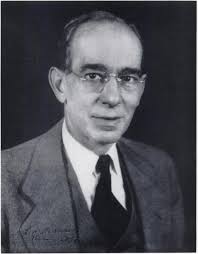Louis Harry Newburgh
Louis Harry Newburgh (1883–1956) was an American physiologist and medical researcher known for his pioneering work in the field of metabolism and nutrition. His research has significantly contributed to our understanding of the human body's metabolic processes and the role of diet in health and disease.
Early Life and Education[edit | edit source]
Newburgh was born in 1883 in New York City. He completed his undergraduate studies at Harvard University, where he developed an interest in biology and chemistry. He then pursued his medical degree at Columbia University's College of Physicians and Surgeons.
Career[edit | edit source]
After completing his medical degree, Newburgh joined the faculty of the University of Michigan in 1919, where he served as the director of the Clinical Investigation Unit. He spent the majority of his career at the University of Michigan, where he conducted groundbreaking research on metabolism and nutrition.
Newburgh's research focused on understanding the body's metabolic processes and the effects of diet on health. He was particularly interested in the role of sugar and fat in the diet and their impact on obesity and diabetes. His work laid the foundation for modern nutritional science and has had a profound impact on our understanding of diet and health.
Legacy[edit | edit source]
Newburgh's contributions to the field of physiology and nutrition have had a lasting impact. His research has informed dietary guidelines and has helped shape our understanding of the relationship between diet and health. His work continues to be cited in contemporary research, demonstrating its enduring relevance.
See Also[edit | edit source]
References[edit | edit source]
This article is a physiologist stub. You can help WikiMD by expanding it!
Search WikiMD
Ad.Tired of being Overweight? Try W8MD's physician weight loss program.
Semaglutide (Ozempic / Wegovy and Tirzepatide (Mounjaro / Zepbound) available.
Advertise on WikiMD
|
WikiMD's Wellness Encyclopedia |
| Let Food Be Thy Medicine Medicine Thy Food - Hippocrates |
Translate this page: - East Asian
中文,
日本,
한국어,
South Asian
हिन्दी,
தமிழ்,
తెలుగు,
Urdu,
ಕನ್ನಡ,
Southeast Asian
Indonesian,
Vietnamese,
Thai,
မြန်မာဘာသာ,
বাংলা
European
español,
Deutsch,
français,
Greek,
português do Brasil,
polski,
română,
русский,
Nederlands,
norsk,
svenska,
suomi,
Italian
Middle Eastern & African
عربى,
Turkish,
Persian,
Hebrew,
Afrikaans,
isiZulu,
Kiswahili,
Other
Bulgarian,
Hungarian,
Czech,
Swedish,
മലയാളം,
मराठी,
ਪੰਜਾਬੀ,
ગુજરાતી,
Portuguese,
Ukrainian
Medical Disclaimer: WikiMD is not a substitute for professional medical advice. The information on WikiMD is provided as an information resource only, may be incorrect, outdated or misleading, and is not to be used or relied on for any diagnostic or treatment purposes. Please consult your health care provider before making any healthcare decisions or for guidance about a specific medical condition. WikiMD expressly disclaims responsibility, and shall have no liability, for any damages, loss, injury, or liability whatsoever suffered as a result of your reliance on the information contained in this site. By visiting this site you agree to the foregoing terms and conditions, which may from time to time be changed or supplemented by WikiMD. If you do not agree to the foregoing terms and conditions, you should not enter or use this site. See full disclaimer.
Credits:Most images are courtesy of Wikimedia commons, and templates, categories Wikipedia, licensed under CC BY SA or similar.
Contributors: Prab R. Tumpati, MD

